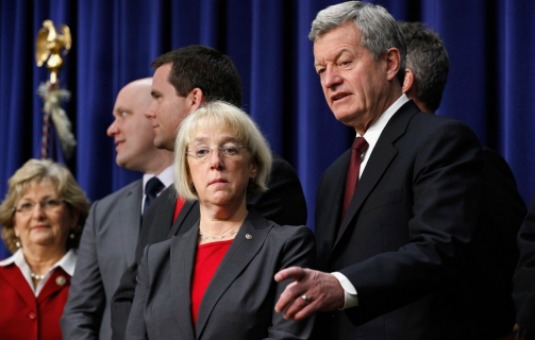And the Super Winners Are...

“Winners and Losers” headlines abounded after the Joint Select Committee on Deficit Reduction (JSC) whimpered to an end.
One of the most interesting analyses was in The Hill, written by Bob Cusak, although we disagree with some of his picks.
Here is our analysis. "and, the winner is…the Democrats!”
Here’s why we pick the Democrats as overwhelming winners in the past 11 month of the Fiscal Follies:
1—Republicans voted to “end Medicare as we know it” when both House and Senate GOP members voted for the Fiscal Year 2012 budget devised by House Budget Committee Chairman Paul Ryan, handing Democrats a message weapon of historically great strength.
2—President Obama absented himself almost entirely from the debate, leaving all the headlines to JSC gridlock festooned with pictures of dejected JSC members, all reinforcing the image of an incompetent Congress. JSC failure helps his re-election.
3—Democrats were able to fashion across-the-board cuts (for the sequester) that exempted almost all of the national safety net programs that Democrats care most about, leaving the defense and annually appropriated domestic accounts vulnerable to cuts of as much as 10% in the future (for a complete list of exempted programs, see here – starting on page 22).
4—Progressive Democrats will see huge defense spending cuts if the sequester in January 2013 occurs, despite pro-defense Senators and House Members who vehemently pledge to overturn the sequester cuts for defense. These defense stalwarts will find the road to repeal filled with parliamentary and political IEDs, leaving progressives in the Democratic caucus pleased.
5—Finally, and much-overlooked, the annual appropriations process is stalled once again in Congress, with the likelihood that 9 of the 12 bills funding the government will be mashed into another Continuing Resolution or, less probably, into an Omnibus bill. Either way, drastic cuts in appropriated programs have been avoided, at least for this year.
It wasn’t a complete sweep for Democrats of course.
Corporate interests won big, also.
1—Above all, the fossil fuel industries (coal, crude oil and natural gas), who anticipated as much as $30 billion in tax increases, but escaped with none.
2—The pharmaceutical industry, who feared all sorts of mayhem in the health entitlement areas.
3—Wall Street, where rumors that the JSC might tackle “carried interest” made many hedge fund managers nervous.
4—Big agriculture, who miraculously escaped any changes in subsidies despite record farm incomes.
5—And above all, all of the millionaire lobbyists in town who will now be kept as busy as possible trying to protect their clients as Congress truly begins to focus on tax reform in 2013.
A couple of other winners were Rep. Jeb Hensarling, the JSC co-chair who transformed his image from hard-rock ideologue to a more pragmatic legislator, and Sen. Rob Portman, who behind the scenes tried to forge a grand bargain of entitlement and taxes.
Losers included Grover Norquist, the anti-tax zealot, who has seen the beginning of the end of his reign of terror against pragmatic Republicans. Defense Secretary Leon Panetta, who has to fight against the odds and his own President to salvage Pentagon programs.
Above all, the biggest loser is the American citizen who saw in full view the weakness and rigidity of Congress.
The common refrain now is “we will settle this in the 2012 elections.” That is, gently, hogwash. Republicans are likely to hold on to the House, but by a slightly smaller margin than now; pick up control of the Senate, but by only 2-3 seats; and have to be considered at this point slight favorites to take the White House.
If those projections prove right, legislative gridlock seems once again assured.
As we wrote late last year, and earlier this year, the person who will break the gridlock and force action is some unknown bond trader in Japan or on Wall Street, who will determine at some point, perhaps in 2013, that United States debt is not the safe haven any more. He will begin selling. Others will follow. It will happen almost overnight.
Congress’ failure throughout this year to begin to resolve the nation’s coming fiscal crisis will be the subject of books in the future. Perhaps in 2025, when the yuan threatens to replace the dollar as the global reserve currency.
For now, the ideologues on both sides can smile, secure in the knowledge that when that bond trader decides to move, they will be safely home in retirement, enjoying their government pensions.

